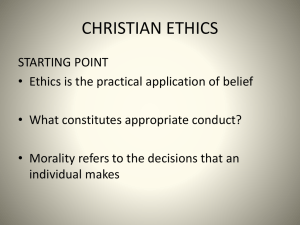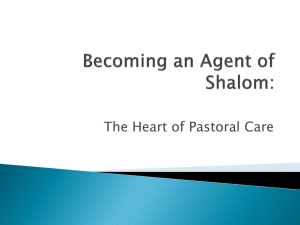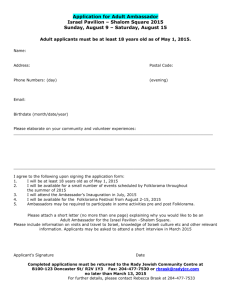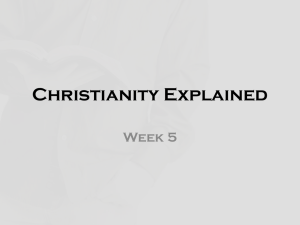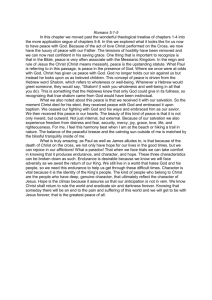Student Essay Template - Flood Church | DIVEintoFLOOD.com
advertisement
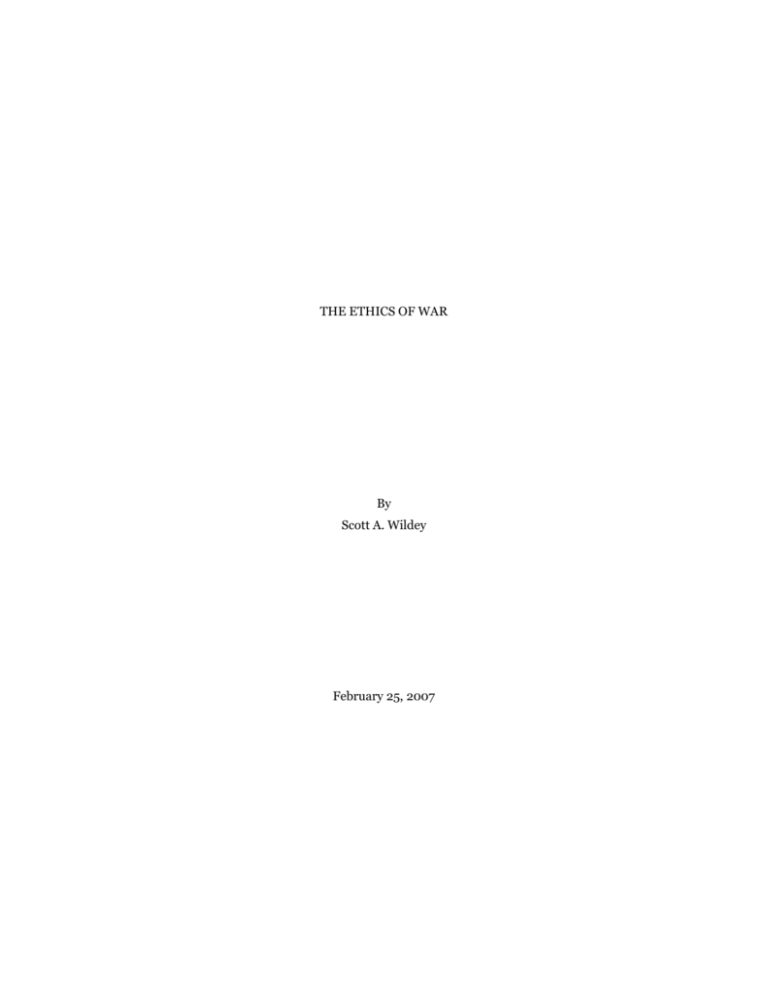
THE ETHICS OF WAR By Scott A. Wildey February 25, 2007 Wildey, Scott. 2 The Ethics of War What is needed is a realization that power without love is reckless and abusive, and love without power is sentimental and anemic. Power at its best is love implementing the demands of justice, and justice at its best is power correcting everything that stands against love. ~Dr. Martin Luther King, Jr., from Where Do We Go From Here? (1967) The ethics of war is at the forefront of debate in American today. “The War on Terror” has turned into a war in Iraq. Over three thousand U.S. soldiers have died, and over 100,000 Iraqis in what seems to be an insatiable effort.1 We are discovering that fighting a concept (terror) is near impossible. However, the question remains, “Have we discovered that going to war and defeating a human enemy is possible?” Or, do wars merely beget more wars? After all, has any century, at any time, really been at peace? One issue that is not impossible to see is why the United States could presume to win a war—even if it is against a notion like terror. Unarguably, we are the most powerful nation in history and spend approximately 50% of the world’s military budget.2 Furthermore, we are the only nation to have used a nuclear weapon(s) in combat—decimating entire cities to ensure victory. All of this under the auspice of “Peacemaking.” And, though our definition of peacemaking may be up for debate, our track record is not. The American government has only been consistent in peacemaking where the United States has had interests. Rwanda, Liberia, Sierra Leone, Sudan, and other African nations are a testament to our economic influence when it comes to the goodwill of our foreign policy. It is clear than, that government entities, such as the U.S., prioritize practicality when making decision on war. Although the practical issues of war are valid, Christians are to be concerned with a peace that transcends all understanding (Phi. 4:7). Questions of ethics should be paramount for any follower of Christ in any culture, in any country, and on any continent—even over 100,000 Iraqi deaths may be very conservative. Johns Hopkins University estimates 655,000, more than the state of Portland. Retrieved from: http://www.linfield.edu/review/article.php?aid=2975. 2 Taken from Dr. Glen Scorgie, Movie Theology: Action and Violence, Winter, 2007, Bethel Seminary San Diego. 1 Wildey, Scott. 3 nationalistic goals and ideals. Our primary citizenship resides in the Kingdom of God. There is no longer a theocracy engaged in Holy War, as in the days of Israel. God’s People are now spread out over the globe as Christ intended and the book of Acts foretold (1:8).3 Our purpose is to advance God’s will in the world. The question that is most important then becomes, “What is God’s will in the world?” Shalom is the Biblical concept that best represents God’s intention for the world. Shalom loosely means, “Everything as it should be.”4 And how should things be? Jesus affirms that the highest command is to love God and neighbor with our whole person (Mt. 19:19, 22:39; Mk. 12:31, 33; Lk. 10:27; Rm. 13:9). We are most complete when we obey God’s commands and remain in His love (John 14:21, 15:10). And as Paul would sum up, “Love does no harm to its neighbor. Therefore love is the fulfillment of the law” (Rom. 13:10. Cf. Gal. 5:14; Jam. 2:8). So, for Christians, at the center of the war debate is ethics. And ethics asks the questions: How do we love God? And, as we remain in Christ, how ought our relationships with others be? Christians over the centuries have responded to the ethical questions of war in three main ways: (1) Nationalism (Holy War), (2) Selectivism (Just War), and (3) Pacifism.5 On the surface, the command to love God and neighbor appears to commend the Pacifist position. It is important to note that Pacifism is not “passivism.” There is nothing passive about non-violent resistance. The events of Jesus’ last day on earth are a stark correction to that critique— bolstered by the lives of Ghandi and Dr. Martiin Luther King, Jr.6 With that being said, shalom is not merely the lack of hostility either. Rather, shalom is actively pursuing God’s justice in the world. I.e., there is no shalom without justice. Shalom represents redeemed creation when Christ returns, setting everything, as it should be. Knight, George W. III. “Can A Christian Go to War.” Readings in Christian Ethics, ed. David K. Clark and Robert V. Rakestraw (Grand Rapids: Baker, 1996), 495-500. 4 Perry B. Yoder, Shalom: The Bible’s Word for Salvation, Justice and Peace (Newton, KS: Faith and Life, 1987; reprinted Nappanee, IN: Evangel, 2001). 5 Scorgie, Glen and Ted Kornweibel. God and War: A Christian Perspective (Public Lecture at Flood Church, April 27, 2003. Retrieved from: http://www.diveintoflood.com/experience/messages/message_list.php.) 6 Hoekema, David A. “A Practical Christian Pacifism.” Readings in Christian Ethics, ed. David K. Clark and Robert V. Rakestraw (Grand Rapids: Baker, 1996), 516-520. 3 Wildey, Scott. 4 Redeeming creation to a place it ought to be means redistributing power—and there is not redistributing power without conflict. “All hopes for a future must take into account those who do not want peace and justice.”7 This is the reality of a fallen world where the hearts of people are continually tempted to replace love with power.8 This progression from love to power, and back to love, encapsulates the Biblical story. Therefore, instead of choosing just one of the Christian responses throughout history, it is this author’s position that all three responses (Nationalism, Selectivism, and Pacifism) play an important part of redemptive history. It is the context that determines if a response to war is ethical. And, generally speaking, the Biblical context is portrayed as God’s Progressive Revelation from Nationalism (Holy War) to Pacifism (Shalom), while Selectivism (Jut War) is permitted in a redeemed world still in the process of being redeemed.9 NATIONALISM (HOLY WAR) War in the Old Testament has led many to believe that the Jewish and Christian religion is violent and warlike by nature. In a day and age when Muslim extremists proclaim “Jihad”, it might be easy to see how one could look to the Scriptures and associate our beliefs with a “convert at all costs” mentality. And, with a surface level reading, who could blame them. After all, Numbers 21:14 reads, “That is why the Book of the Wars of the LORD says…(emphasis added).” This book was probably an extra-Biblical source of Israel’s history. But, in any case, Israel viewed Yahweh as sovereign over all of human history—actively involved in accomplishing His purposes through His chosen people. This resulted in God acting on Israel’s behalf on many occurrences: Drowning the Egyptian soldiers when parting the Sea of Reeds (Ex. 15); Flattening the walls of Jericho (Josh. 6); Making the sun stand still and hurling hailstones to defeat the Gibeonites (Josh. 10); and Sending fire to defeat the Moabite soldiers (2 Kg. 1:1-16) Wood, John A. Perspectives on Ware in the Bible (Macon: Mercer, 1998), 154. Taken from HS 227 Lecture Notes: The Life and Teaching of Henri Nouwen, with Dr. Jim Smith, Bethel Seminary San Diego, Spring ’05. 9 Wood, John A. Perspectives on Ware in the Bible, 154. 7 8 Wildey, Scott. 5 to name a few. Not to mention God’s sending the great deluge only to save Noah and his family in Genesis chapter six (Note: God did this because of the pervasive violent nature of the earth’s inhabitants). It may be no wonder that God is described as a warrior: “Who is this King of glory? The LORD strong and mighty, the LORD mighty in battle” (Ps. 24:8). God’s acts of war seem to continue through His people. On many occasions Israel engages in Holy War to secure the Promised Land and protect her identity. Furthermore, at times, God calls for total annihilation: Moses ordered the killing of three thousand “friends, brothers and neighbors” because of the golden calf (Ex. 32:27-28); The extermination of the Amalekites (Ex. 17:8-16); Moses is infuriated at the incompleteness of destruction (Num. 31); The insurance of no survivors as stated in Deuteronomy 2:34 (The TNIV explains the term ‘destroyed’ as meaning: the irrevocable giving over of things or persons to the LORD, often by totally destroying them); And, in Joshua, the people of Jericho (6:21), Ai (8:26, 28), and Hazor (11:14), are totally wiped out.10 What can we say about a God, a people, and a history who found such offensive practices necessary? First of all, it is important to note, that all history in a sense, is a history of war.11 Meaning, it’s understandable to critique a religion claiming shalom, but it is disingenuous to do so in a vacuum. Can the history of any culture, government, or nation, claim to be free from waging war? The most profitable questions would be: “If God is the God of peace, why would He wage war? Couldn’t God simply create or change circumstances to institute shalom on earth?” The answers to these questions—as much as we can understand them—seem to be “yes” and “no”. The reason for this is that love requires free will and free will leaves the door open for injustice. Shalom cannot co-exist with injustice. God created the universe in a state of shalom—everything was as it should be. In this sense, God did institute shalom on earth by his creative act. This was disrupted when Adam and Eve used their free will for power over love (the power to know good and evil). Although 10 11 Wood, John A. Perspectives on Ware in the Bible (Macon: Mercer, 1998), 77ff. ibid. Wildey, Scott. 6 humanity had the knowledge of good and evil, they did not have the power or nature to meet the demands of good and evil—something only God possesses. This unleashed chaos on the earth— threatening love and justice for all of creation. So, as the story of Genesis three tells us, it was humankind who initiated war, not God. It is against God’s nature and being to exist outside of shalom—so humanity became estranged from Him via free will. However, because God loved us so much, He reinstituted a plan to redeem the earth and restore shalom to all creation. The story of the Old Testament portrays God’s intervention of justice back into creation, in order to redistribute power to its original state. This is why the wars waged by Yahweh were Holy—righteous in nature to ensure His plan of redemption. As W. F. Albright has said: “It was fortunate for the future of monotheism that the Israelites of the Conquest were a wild folk, endowed with primitive energy and ruthless will to exist, since the resulting decimation of the Canaanites prevented the complete fusion of the two kindred folk which would almost inevitably have depressed Yahwistic standards to a point where recovery was impossible. Thus the Canaanites, with their orgiastic nature-worship, their cult of fertility in the form of serpent symbols and sensuous nudity, and their gross mythology, were replaced by Israel, with its nomadic simplicity, and purity of life, its lofty monotheism, and its severe code of ethics.”12 This obscure nation of Israel, who existed on a small, but highly strategic piece of land, consistently surrounded by hostile enemies waiting to conquest, was God’s instrument to bring peace on earth.13 Even if this is reasonable, some may still ask, “Why is the New Testament so different from the Old? How can these two covenants be reconciled?” The fact of the matter is, the Old and New Testaments are unified in story, theme and outcome. It is only through the lens of progressive revelation that we can see God’s plan of shalom. We must view the story as a whole to understand the whole story.14 Wood, John A. Perspectives on Ware in the Bible (Macon: Mercer, 1998), 214. Ibid. 14 Scorgie, Glen and Ted Kornweibel. God and War: A Christian Perspective (Retrieved from: http://www.diveintoflood.com/experience/messages/message_list.php). 12 13 Wildey, Scott. 7 The Holy Wars waged by Israel were for the most part, defensive.15 Furthermore, every instance of war in the Old Testament were not a part of Yahweh’s plan. David consults Yahweh on attack plans (1 Sam. 30:6-10), but appears more and more to reflect the common practices of monarchs by engaging in ware for expansionists purposes (1 Kings 8:1-14) and by brutalizing some of the conquered nations (2 Sam. 8:3-7, 13-14; 1 Kings 11:14-16).16 In a sense, David and his kingdom reflected the Fall in pursuing power over love. This highlights the fact that God’s progressive acts of restoring shalom cannot be thwarted, whether by foreign enemies, or even by His own people. The prophets, like Isaiah, point to this reality. The Old Testament is saturated with the progression of shalom—pointing to the remarkable nature of God’s plan: “In that day Israel will be third, along with Egypt and Assyria, a blessing on the earth” (Isa. 19:24). Reliance and trust in God is the only way people can participate in redemption. PACIFISIM As stated above, pacifism is not “passivism”. The incarnation of God into the world is more earth shattering than anything depicted in the Old Testament. It is one thing for a human being to kill or murder another. It is something totally different that the God of the universe humbled himself, allowing His creatures to betray, mock, scorn, torture, and finally murder Him. In fact, it is incomparable (Phil. 2:1-11). So though our limited understanding may lead us to pause when thinking of God’s acts in the Old Testament, at the very least, we should leave our judgment of Him suspended at the thought of his radical act of atonement. Or as the apostle Paul would say, it is one thing for God to die for us, but “even death on a cross” (Phil. 2:8). The Incarnation (Jesus’ life, death, resurrection and ascension) is the key event that redeems history. In this sense, it is the center of all history. There is no doubt that Jesus practices and teaches pacifism, but this is not inconsistent with the Old Testament. The reason 15 16 Wood, John A. Perspectives on Ware in the Bible, 154. Cited from J.M. Ford. Ibid., 81. Wildey, Scott. 8 for this is that Jesus, God incarnate, represents full and redeemed humanity—as he was fully God and fully human. Or, as the author of Hebrews puts it, Jesus “pioneered and perfected our faith” (Heb. 12:2). We are to “fix our eyes on Jesus”. This assumes a point in front of us—a place we are going to. Paul seems to share this idea—that we are not yet fully complete, but rather, in a process of becoming complete (1 Cor. 13: 8-11). In fact, he even shares of his struggle (Rom. 7). This is a concept that the New Testament writers grasped—the idea of already, but not yet. The idea that we are redeemed in Jesus waiting to be fully redeemed by Jesus. Although it is a paradox, it is helpful in explaining the apparent discrepancy between Old and New. That is why we can hold and fix our point of reference on Jesus’ life and teaching. We are to be “Peacemakers” (Mt. 5:9) and to “love our enemies and pray for those who persecute us” (Mt. 5:44). This is our ideal and puts a question mark against any and every decision concerning war. As God’s ambassadors, our primary responsibility is reconciliation (2 Cor. 5:17ff). Our role is to be instruments, so that the shalom of heaven may be established on earth (Mt. 6:10). Many point to the book of Revelation to refute progressive revelation. They view the pacifism of Jesus as a hiccup in between the Old and New Testament’s depiction of the God of wrath and war. The reason for this is because the language of Revelation, the last chapter in the Biblical story, is one of battle and warlike imagery. Similarly to the Old Testament, a surface reading may render such a view. However, as we delve beneath the surface we find the blood of Revelation is that of the slain lamb. Instead of inflicting pain, Jesus has absorbed it. The warrior God has turned the tables on chaos and reversed humanities hostilities by becoming the crucified one. God’s victory is linked to His own death, a love sacrifice, rather than the death of His enemies. “Those who fight and follow the lamb in battle, fight by his blood and by the world of their testimony. They do not love their loves so much as to shrink from death, but follow the Wildey, Scott. 9 lamb in sacrifice. They share in the lamb’s victory by continuing similar sacrificial witness in the world. The exhortation is not to wage war as people know, but to persevere in faithfulness.”17 William Klassen sees the message of Revelation in a similar way: “For those who follow the power of love rather than the love of power will conquer. But only those who follow the lamb in serving others unto death will share in that victory.”18 If Jesus represents the end goal of God’s revelation, and our goal is to pursue that end, then where does that leave us in the here and now? Is non-violent resistance always the answer? It is vital for us to wrestle with these questions and not take them for granted. They are the questions of Just War ethics. SELECTIVISM (JUST WAR) At this point it may seem clear that if pacifism is our end goal, then there is no reason to practice anything other than non-violent resistance in today’s world. However, as stated above, peace is more than the lack of hostility. Rather, shalom is justice realized. As David A. Hoekema has stated, “Capitulation to the forces of evil cannot be moral.”19Or as Edmund Burke said, “The only thing necessary for the triumph of evil is for good men to do nothing.” I.e., by doing nothing we are really passive participants. Perry B. Yoder puts it another way: ““Otherwise, might it not continue to seem to the third-world poor that the position of doing no overt violence is really not a peace position at all, but support for selective violence? It is against violence by the oppressed but apparently comfortable with violence and injustice by the oppressors.”20 In this fashion, Just War follows an ethic of justice that recognizes the place of human free will and responsibility in the activity of God to bring about shalom to the earth. Just War should not be confused with Nationalism, or waging war out of self-interest, but rather, Just 17 Scorgie, Glen and Ted Kornweibel. God and War: A Christian Perspective (Retrieved from: http://www.diveintoflood.com/experience/messages/message_list.php). Cf. Spilsbury, Paul. The Throne, the Lamb & the Dragon: A Reader’s Guide to the Book of Revelation. Downers Grove: IVP, 2002. 18 Wood, John A. Perspectives on Ware in the Bible, 95-96. 19 Hoekema, David A. “A Practical Christian Pacifism.” Readings in Christian Ethics, ed. David K. Clark and Robert V. Rakestraw (Grand Rapids: Baker, 1996), 516. 20 Yoder Perry B. Shalom: The Bible’s Word for Salvation, Justice and Peace (Newton, KS: Faith and Life, 1987). Wildey, Scott. 10 War seeks to defend in order to protect the process of progressive revelation towards peace on earth and good will to all people. It is also important to recognize, that Just War is not the ideal, and not necessarily condoned by God, but permitted in a fallen world. A parallel might be drawn with the issue of divorce—another result of the fallen world that divides God’s intention for relationships. When asked about divorce, Jesus recognized the reality of infidelity. At the same time, instead of debating about the ethics of separation, he pointed to the intention and purpose of marriage (Mt. 5). In the same way, we cannot ignore the present state of the world while we seek to restore God’s ideal for us. War should always be the last option. And we should be honest that war is always a failure of the intention of human relationships. The governing laws of Just War are in place to recognize the reality of evil and to limit the negative repercussions that war has on peace.21 Although the issue of ethics and war are complex and dynamic, it is clear that followers and Christ and His Word are to pursue shalom, and that one day, all who turn to God in trust and faith will live in peace for all eternity. God’s will is that all people will accept this peace. Furthermore, those who follow Him, are to be imitators of Him as agents of peace—bringing the very “fragrance of Christ” to a hostile world (2 Cor. 2:14). It is also clear, however, that every since human beings rebelled against God in the garden, the temptation to replace love with power has been a destructive force that must be reckoned with. God loved the world so much that he instituted a plan to reverse sin and death (Jn. 3:16). This plan is recounted in the Biblical story. Both Old and New Testaments are uniform in God’s progressive revelation in restoring shalom on earth as it is in heaven. Therefore, instead of simply choosing one response in an effort to understand the ethical The Criteria for Just War is generally accepted: Just cause: only self-defense, or an aggreved third party, not an aggressor war. Precludes a preemptive strike; Right objectives: to secure justice, protect innocent, champion human rights; Intention must be as righteous as the cause: Cannot be motivated by hatred or revenge, or annexation, or permanent occupation; Last Resort: All efforts at negotiation and reconciliation; Announcement of Intention, and Stated Reasons; Formal Declaration by legit public authority that determines war will be waged justly; Reasonable presumption of success. Taken from: Scorgie, Glen and Ted Kornweibel. God and War: A Christian Perspective (Retrieved from: http://www.diveintoflood.com/experience/messages/message_list.php). 21 Wildey, Scott. situation of war, it is more accurate to view the distinct contexts involved in the progressive process. Holy War, a one time essential element in preserving the redemptive plan, has been succeeded by the pursuit of non-violent resistance with intermittent gaps of Just War, that are not ideal, but necessary as the world is not yet fully redeemed. Shalom cannot exist without justice. And justice cannot exist in a world where power is pursued over love. The great prophet Micah who stood in the middle of human history best describes this process. He had one foot on the side of establishing God’s plan on earth, and the other foot firmly planted on the side of Christ—the slain lamb pierced for our transgressions, in order to reverse the destructive forces of humanity’s quest for power. How do we pursue shalom today? We “act justly and love mercy and walk humbly with our God” (Mic. 6:8). 11 Wildey, Scott. Bibliography Barrs, Jerram. “The Just War Revisited.” Readings in Christian Ethics, ed. David K. Clark and Robert V. Rakestraw. Grand Rapids: Baker, 1996. 501-504 Hoekema, David A. “A Practical Christian Pacifism.” Readings in Christian Ethics, ed. David K. Clark and Robert V. Rakestraw. Grand Rapids: Baker, 1996. 516-520. Knight, George W. III. “Can A Christian Go to War.” Readings in Christian Ethics, ed. David K. Clark and Robert V. Rakestraw. Grand Rapids: Baker, 1996. 495-500. Scorgie, Glen and Ted Kornweibel. God and War: A Christian Perspective. Public Lecture at Flood Church, April 27, 2003. Retrieved from: http://www.diveintoflood.com/experience/messages/message_list.php. Sider, Ronald J. and Richard K. Taylor. “Jesus and Violence: Some Critical Objections.” Readings in Christian Ethics, ed. David K. Clark and Robert V. Rakestraw. Grand Rapids: Baker, 1996. 505-515. Wood, John A. Perspectives on Ware in the Bible. Macon: Mercer University Press, 1998. Extended Powell, Mark Allan. “Matthew's Beatitudes: Reversals and Rewards of the Kingdom.” The Catholic Biblical Quarterly, 58, no. 3 (1996): 460-79. Yoder Perry B. Shalom: The Bible’s Word for Salvation, Justice and Peace. Newton, KS: Faith and Life, 1987 (reprinted Nappanee, IN: Evangel, 2001). For Further Study Boyd, Gregory A. God at War: The Bible & Spiritual Conflict. Downers Grove: IVP, 1997. Spilsbury, Paul. The Throne, the Lamb & the Dragon: A Reader’s Guide to the Book of Revelation. Downers Grove: IVP, 2002. 12
